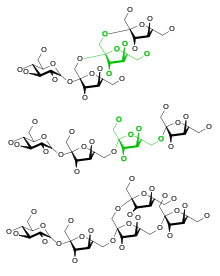Psychobiotic
Psychobiotics is a term used in preliminary research to refer to live bacteria that, when ingested in appropriate amounts, might confer a mental health benefit by affecting microbiota of the host organism.[1] Whether bacteria might play a role in the gut-brain axis is under research. However, as of 2018, there is a paucity of randomized controlled trials testing the effects of live, ingested bacterial strains on clear mental health outcomes, and those that have been done provide inconclusive results when viewed in aggregate.[2][3]
Types

In experimental probiotic psychobiotics, the bacteria most commonly used are gram-positive bacteria, such as Bifidobacterium and Lactobacillus families, as these do not contain lipopolysaccharide chains, reducing the likelihood of an immunological response.[1] Prebiotics are substances, such as fructans and oligosaccharides, that induce the growth or activity of beneficial microorganisms, such as bacteria on being fermented in the gut.[1][4] Multiple bacterial species contained in a single probiotic broth is known as a polybiotic.[5]
Research
The field of psychobiotics in humans is nascent, though there have been many studies in rodents demonstrating increased cognitive functioning, decreased anxiety, and decreases in stress related pathology.[1] However, the human literature has yet to catch up with most rodent experiments, and has so far failed to produce a high number of well designed, randomized trials. Several recent reviews have highlighted the fact that there is a need for more diverse human studies, particularly because those that exist are often hard to compare and have contradictory outcomes.[2][3]
References
- Sarkar A, Lehto SM, Harty S, Dinan TG, Cryan JF, Burnet PW (November 2016). "Psychobiotics and the Manipulation of Bacteria-Gut-Brain Signals". Trends in Neurosciences. 39 (11): 763–781. doi:10.1016/j.tins.2016.09.002. PMC 5102282. PMID 27793434.
- Romijn AR, Rucklidge JJ (October 2015). "Systematic review of evidence to support the theory of psychobiotics". Nutrition Reviews. 73 (10): 675–93. doi:10.1093/nutrit/nuv025. PMID 26370263.
- Liu B, He Y, Wang M, Liu J, Ju Y, Zhang Y, Liu T, Li L, Li Q (July 2018). "Efficacy of probiotics on anxiety-A meta-analysis of randomized controlled trials". Depression and Anxiety. 35 (10): 935–945. doi:10.1002/da.22811. PMID 29995348.
- Hutkins RW, Krumbeck JA, Bindels LB, Cani PD, Fahey G, Goh YJ, Hamaker B, Martens EC, Mills DA, Rastal RA, Vaughan E, Sanders ME (February 2016). "Prebiotics: why definitions matter". Current Opinion in Biotechnology. 37: 1–7. doi:10.1016/j.copbio.2015.09.001. PMC 4744122. PMID 26431716.
- Bambury A, Sandhu K, Cryan JF, Dinan TG (December 2018). "Finding the needle in the haystack: systematic identification of psychobiotics". British Journal of Pharmacology. 175 (24): 4430–4438. doi:10.1111/bph.14127. PMC 6255950. PMID 29243233.
- Dinan TG, Stanton C, Cryan JF (November 2013). "Psychobiotics: a novel class of psychotropic". Biological Psychiatry. 74 (10): 720–6. doi:10.1016/j.biopsych.2013.05.001. PMID 23759244.
_Lactobacillus_acidophilus_(D%C3%B6derlein_bacillus).jpg)